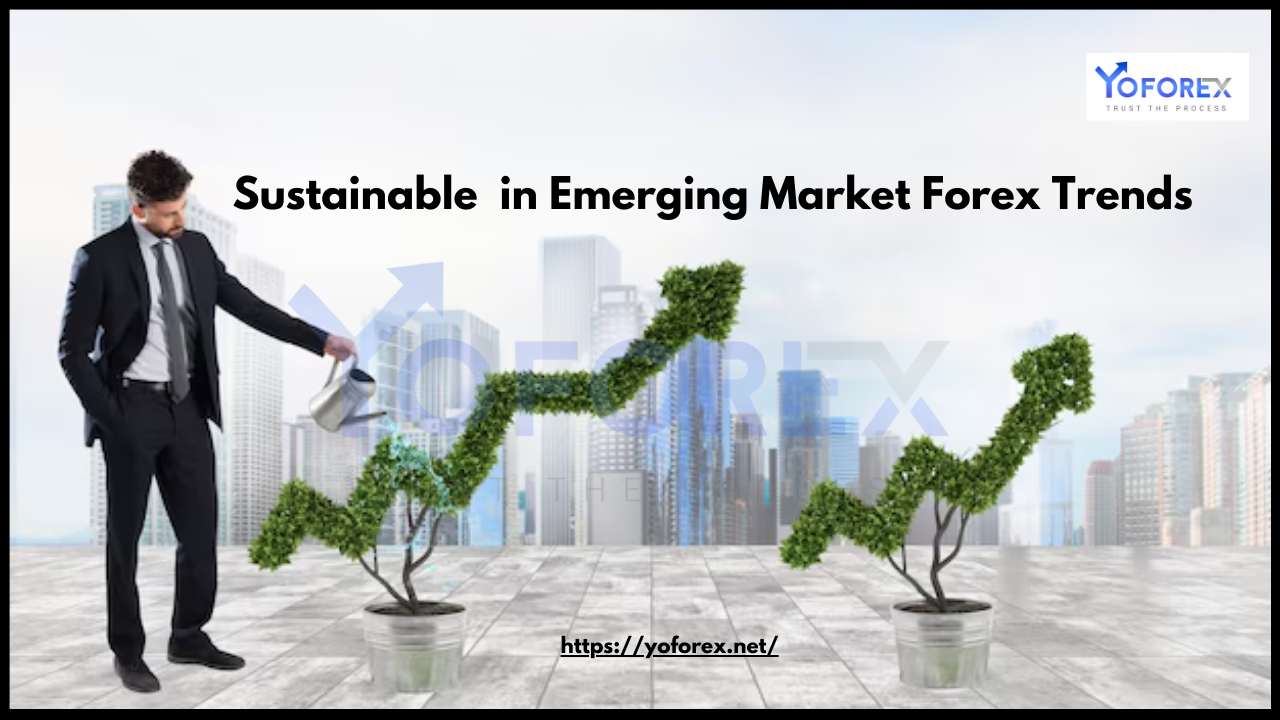Sustainable finance has become a significant focus in global financial markets, particularly in emerging markets where economic development, environmental concerns, and social stability are closely interconnected. With forex markets serving as key drivers of capital flows, the integration of sustainability principles into financial instruments and trading strategies is reshaping how investors and policymakers approach currency markets.
This blog explores the role of sustainable finance in emerging market forex trends, examining how green investments, ESG (Environmental, Social, and Governance) considerations, and regulatory shifts influence forex trading dynamics and economic growth.
The Rise of Sustainable Finance in Forex Markets
Sustainable finance refers to financial activities that consider environmental and social factors alongside traditional financial metrics. The demand for sustainable investments has increased due to global climate commitments, corporate responsibility initiatives, and investor preferences for ethical financial practices.
In emerging markets, sustainable finance has gained traction as governments and financial institutions recognize the need for long-term economic resilience. The integration of sustainability in forex markets manifests in several ways:
- Green Bonds and Sustainable Investments: Many emerging economies issue green bonds to attract capital for sustainable projects, indirectly influencing forex markets by increasing demand for local currencies.
- ESG-Informed Currency Trading: Investors now assess countries’ ESG scores when deciding on forex exposure, with currencies of nations with strong sustainability policies gaining favor.
- Regulatory Policies: Governments in emerging markets are introducing policies to encourage sustainable investment, impacting capital flows and currency stability.
Key Emerging Market Forex Trends Linked to Sustainable Finance
1. Green Bond Issuances Strengthening Local Currencies
Green bonds have become a powerful tool for emerging markets to attract foreign investment. Countries like Brazil, India, and South Africa have leveraged green bond issuances to fund sustainable infrastructure, renewable energy projects, and climate resilience initiatives.
When investors purchase these bonds, they need to exchange foreign currency for the local currency, thereby increasing demand and strengthening the national forex rate. This trend highlights the connection between sustainability-linked debt instruments and forex market movements.
2. Impact of ESG Ratings on Currency Valuations
Investors are increasingly factoring in ESG risks when trading forex in emerging markets. Currencies of nations with strong governance frameworks, environmental protections, and sustainable growth policies tend to perform better due to increased investor confidence.
For instance, countries actively pursuing clean energy policies and reducing carbon emissions often attract more foreign direct investment (FDI), leading to capital inflows that bolster their currency against others.
3. Carbon Pricing and Currency Fluctuations
Carbon pricing mechanisms, such as carbon taxes and cap-and-trade systems, impact forex trends in emerging markets. Countries implementing strong carbon pricing policies may experience shifts in forex valuation as businesses adjust their production costs and foreign investors reassess risk premiums.
For example, an emerging market introducing a carbon tax might see short-term volatility in its currency due to adjustments in capital flow expectations. However, in the long term, a commitment to sustainability can stabilize forex rates by fostering economic resilience.
4. Sustainable Trade Agreements and Their Forex Influence
Emerging markets engaging in sustainable trade agreements often experience currency appreciation due to increased foreign investment and trade incentives. Agreements that prioritize environmental protection, fair labor practices, and responsible resource management help stabilize market confidence and attract forex traders seeking sustainable returns.
For example, regional trade agreements promoting sustainable supply chains can strengthen local currencies as they reduce regulatory risks and encourage responsible foreign investment.

5. Central Bank Policies on Green Finance
Central banks in emerging economies are increasingly incorporating sustainability into their monetary policies. Some banks are setting guidelines for financial institutions to consider climate risks when lending, which impacts forex markets by influencing capital flow patterns.
In cases where central banks promote green financing, national currencies may benefit from reduced inflationary pressures and improved investor sentiment, leading to forex appreciation over time.
Challenges in Integrating Sustainable Finance into Forex Markets
While sustainable finance is gaining momentum, integrating it into emerging market forex trends presents challenges:
- Market Volatility: Sustainability initiatives can cause short-term forex volatility, as markets adjust to new regulations and investor sentiment shifts.
- Data and Transparency Issues: Emerging markets often struggle with consistent and transparent ESG data, making it difficult for forex traders to assess sustainable finance risks accurately.
- Regulatory Uncertainty: Rapidly evolving sustainability regulations can create uncertainty for forex investors, leading to unpredictable currency movements.
The Future of Sustainable Finance in Forex Markets
The future of forex trading in emerging markets is increasingly tied to sustainable finance initiatives. As more investors incorporate ESG criteria into their decision-making, forex trends will continue to reflect sustainability-related economic shifts.
Potential developments include:
- AI and Big Data Integration: Advanced data analytics and AI-driven sustainability assessments will enhance forex traders’ ability to evaluate ESG risks in emerging markets.
- Stronger Regulatory Frameworks: Governments and financial institutions will refine sustainability regulations, leading to more predictable forex market behavior.
- Increased Institutional Adoption: Institutional investors will allocate more capital toward sustainable forex strategies, reinforcing the long-term trend of integrating sustainability into currency markets.
Conclusion
Sustainable finance is reshaping forex trends in emerging markets, with green bonds, ESG considerations, and central bank policies influencing currency valuations. While challenges remain, the shift toward sustainability-driven investment strategies presents long-term opportunities for forex traders and investors seeking stable and ethical returns.
As global sustainability efforts continue gaining momentum, emerging market currencies that align with green finance principles will likely attract greater investor confidence, fostering economic growth and financial stability.
Stay Updated & Download: https://yoforex.net/sustainable-finance-in-emerging-market-forex-trends/
😎 Happy Trading 😎

